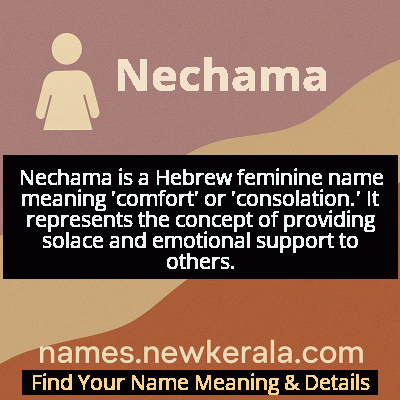Nechama Name Meaning & Details
Origin, Popularity, Numerology Analysis & Name Meaning of Nechama
Discover the origin, meaning, and cultural significance of the name NECHAMA. Delve into its historical roots and explore the lasting impact it has had on communities and traditions.
Name
Nechama
Gender
Female
Origin
Hebrew
Lucky Number
9
Meaning of the Name - Nechama
Nechama is a Hebrew feminine name meaning 'comfort' or 'consolation.' It represents the concept of providing solace and emotional support to others.
Nechama - Complete Numerology Analysis
Your Numerology Number
Based on Pythagorean Numerology System
Ruling Planet
Mars
Positive Nature
Generous, passionate, energetic, and humanitarian.
Negative Traits
Impulsive, impatient, moody, and can be overly emotional.
Lucky Colours
Red, maroon, scarlet.
Lucky Days
Tuesday.
Lucky Stones
Red coral, garnet.
Harmony Numbers
1, 2, 3, 6.
Best Suited Professions
Military, sports, philanthropy, leadership roles.
What People Like About You
Courage, energy, leadership, generosity.
Famous People Named Nechama
Nechama Leibowitz
Biblical scholar and educator
Revolutionized Jewish education through her Torah study materials
Nechama Tec
Holocaust scholar and sociologist
Author of 'Defiance' which inspired a major Hollywood film
Nechama Rivlin
First Lady of Israel
Prominent advocate for education and environmental causes
Nechama Hendel
Folk singer
Popularized Israeli folk music internationally
Name Variations & International Equivalents
Click on blue names to explore their detailed meanings. Gray names with will be available soon.
Cultural & Historical Significance
The name embodies the Jewish belief that even in darkness, comfort and redemption are possible, making it a name that carries both historical weight and spiritual optimism. In modern times, the name continues to represent the enduring Jewish spirit and the community's ability to find comfort and rebuild after adversity. It serves as a living connection to centuries of Jewish tradition while maintaining relevance in contemporary Jewish life.
Extended Personality Analysis
Women named Nechama are often perceived as nurturing, empathetic individuals who naturally provide comfort to others. They tend to be emotionally intelligent and possess a calming presence that makes them sought after during difficult times. Their inherent understanding of human suffering often leads them to careers in counseling, education, or healing professions where they can exercise their natural gift for consolation.
Nechamas are typically patient listeners who offer wise counsel without judgment, creating safe spaces for others to express vulnerability. They balance this deep empathy with remarkable inner strength, having the resilience to support others while maintaining their own emotional equilibrium. This combination of gentle compassion and quiet fortitude makes them pillars in their communities and families, often serving as the emotional anchor for those around them.
Modern Usage & Popularity
In contemporary times, Nechama remains a popular name within Jewish communities worldwide, particularly among religious and traditional families. While it hasn't achieved mainstream popularity outside Jewish circles, it maintains steady usage and is often chosen for its deep spiritual meaning and connection to Jewish heritage. The name has seen a slight resurgence in recent years as younger generations rediscover traditional Hebrew names with meaningful significance. In Israel, it's considered a classic name that bridges traditional and modern Jewish identity, while in diaspora communities it serves as a meaningful link to cultural roots and continues to be chosen for its beautiful meaning and cultural resonance.
Symbolic & Spiritual Meanings
Symbolically, Nechama represents the human capacity for healing and emotional restoration. It embodies the transition from grief to comfort, from despair to hope, serving as a living testament to resilience. The name carries the metaphorical weight of being a 'balm for the soul' and represents the idea that true comfort often comes through shared human experience and spiritual connection. In a broader sense, it symbolizes the cyclical nature of life where periods of sorrow are inevitably followed by consolation and renewal, making it a name that speaks to universal human experiences of loss and recovery.

